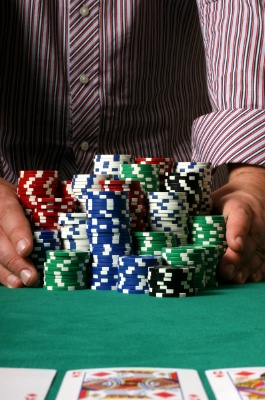|
|
 Depending on the
format of the Sit & Go tournament you're playing, the final part could mean that you're heads-up or still have several opponents to
knock out before cashing. Now that you've reached the "endgame," it's more important that ever to take advantage of every edge in equity
as you look to cash and then to gain all the chips at the table in order to win the tournament. Depending on the
format of the Sit & Go tournament you're playing, the final part could mean that you're heads-up or still have several opponents to
knock out before cashing. Now that you've reached the "endgame," it's more important that ever to take advantage of every edge in equity
as you look to cash and then to gain all the chips at the table in order to win the tournament.
The end of Sit & Go tournaments play out quite a bit differently depending on game type and stakes, but the key element is using your
experience to correctly gauge your opponents' shove and call ranges. Nowadays, there are several high-quality programs available on the
internet that will calculate Independent Chip Modeling (ICM) and allow you the opportunity to study your decisions away from the tables.
Basically, your decisions toward the end of the Sit & Go tournament should be based on: (a) the payout structure, (b) chip-stack
amounts, (c) pre-flop position, and (d) your opponents' tendencies or hand ranges with which they will decide to raise or call a raise.
For example, if you're playing on the bubble with a dominant chip stack, you'll almost certainly want to exert pressure on remaining
players and use the opportunity to chip up. In this position, your opponents' calling ranges to your shoves are likely to be tighter
than normal and you can get away with stealing the blinds much more liberally. In contrast, if you're short stacked and on the Sit & Go
bubble, you'll want to pay close attention to the chip stacks of everyone else at the table and look for the opportune time to either
raise the blinds or call another player's shove. That's assuming of course that you don't wake up with a big hand in the meantime.
As strange as it may seem, there will be certain endgame situations where you should be raising with any two cards and other
circumstances where getting involved in the hand, even when holding a monster, is incorrect. It all depends on your current equity and
how that corresponds with the payouts and your opponents' equity.
As mentioned previously in this article, there are a number of programs that will help you make critical decisions toward the end of a
Sit & Go tournament. Personally, I recommend SNG Wizard (purchase price $99, free trial included) or Odds Oracle ($89 purchase price for
fully-featured application). Both of these programs, along with many others, will turn you into a Sit & Go guru in no time, PROVIDED
THAT you assign correct ranges to your opponents when considering the hands they would likely shove or call with. Although there are a
variety of tools to help with difficult Sit & Go calculations, those calculations won't mean anything if you're not paying attention to
tendencies at the table. For example, if you're assuming that your opponent in the Small Blind is only going to shove on your Big Blind
in a given situation with premium hands, and the real truth is that he/she is getting it all-in with any two cards, you're going to lose
equity (i.e. money). The exact same can be said for the tight or loose characteristics of players who you will be pressuring with all-in
raises while they are in the blinds.
The more experience you gain at a certain Sit & Go level, the more comfortable you'll be making correct evaluations of opponent hand
ranges. Be sure to take notes on players who stick out or make unorthodox decisions, especially deep in a SNG tournament. Pay close
attention to chip stacks, make correct reads on your opponents' shove/call ranges, and use study tools to improve your winrate in Sit &
Go tournaments. The more time you put into improving, the more you'll profit in the end. Best of luck!
Read the other two installments of this strategy article:
Sit N Go Strategy - Part 1: Early Stages and
Sit and Go Tournaments - Part 2: Middle Stages |
|









